The purpose of FARE-talk is to provide an enduring conversation about contemporary topics
relevant to food, agricultural, and resource economics.
Posted Podcasts
- The Economic Consequences of Farmland Policy on Farmland Values in Saskatchewan - March 27th, 2018
- The Future of Food - November 7th, 2017
- Economic Integration Reconsidered - June 26th, 2017
- The Softwood Lumber War - April 9th, 2017
- Examining The Relationship Between Land-Use Regulation And Affordable Housing - November 17th, 2016
- The Meaning and Measure of Household Food Insecurity - July 5th, 2016
- What's The Buzz? A Discussion of Bees and Neonics - June 27th, 2016
- GM Crops and Twenty-First Century Agriculture - March 11th, 2015
- Wind Turbines and Property Values in Ontario: Public Perception and Empirical Evidence - November 18th, 2014
- Africa, Land & Economic Development - August 28th, 2014
- Tenants and Landlords: Who benefits from U.S. Agricultural Subsidies? - January 6th, 2014
- The Food Police: A Well-Fed Manifesto About the Politics of Your Plate. - October 9th, 2013
- The U.S. Farm Bill: Past, Present, and Future Issues - August 20th, 2013
- "Beyond the Indian Act": Examining the Potential Role of Fee-Simple Ownership - December 17th, 2012
- Assessing agricultural policy in the twenty-first century: Who benefits from Agricultural Subsidies?
What happened after tobacco quota ended in Kentucky? - October 25th, 2012 - First Nations Lands and Economies - September 13th, 2012
- Does Dutch Disease Explain Canada's Manufacturing Woes? - June 14th, 2012
- Farm Succession Planning: Reflections and Suggestions - May 11th, 2012
- The Origins, Nature, and Content of the Right to Property: Five Economic Solitudes - February 15th, 2012
- The Canadian Wheat Board (CWB): Assessing the future of wheat marketing in Canada. - October 20, 2011
- Understanding "Rural" Canada: Terms, Trends, and Policy - October 19, 2011
- Standards: Recipes for Reality - July 15, 2011
- Food Prices - July 4, 2011
To View FARE Presentations Click Here.
Share FARE Talk Podcasts:
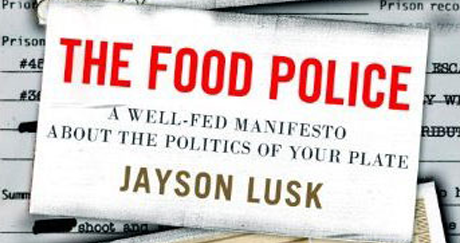
The Food Police: A Well-Fed Manifesto About the Politics of Your Plate. - October 9th, 2013
Listen to the streamed podcast
Description
Host: Dr. B. James Deaton,
Dept. Of Food, Agricultural and Resource Economics (FARE), University of Guelph
Interviewee: Dr. Jayson Lusk serves as Regents Professor and Willard Sparks Endowed Chair in the Department of Agricultural Economics at Oklahoma State University and also serves as the Samuel Roberts Noble Distinguished Fellow at the Oklahoma Council of Public Affairs. You can learn more about Dr. Lusk here
Produced by: Jakub Hyzyk, Centre for Open Learning and Educational Development (COLES), University of Guelph
In this podcast Jayson and I discuss his most recent book: "The Food Police: A Well-Fed Manifesto About the Politics of Your Plate." Available here: https://www.amazon.com/The-Food-Police-Well-Fed-Manifesto/dp/0307987035.
We discuss Jayson’s criticisms of the "food police" and his concern about government led efforts to promote local food, tax soft drinks, and “nudge” diets in a particular direction.
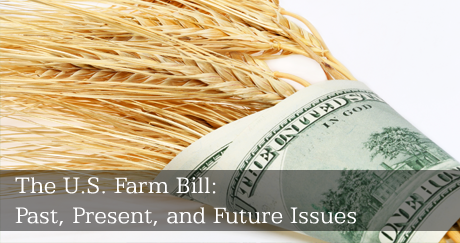
The U.S. Farm Bill: Past, Present, and Future Issues - August 20th, 2013
Listen to the streamed podcast
Description
Host: Dr. B. James Deaton,
Dept. Of Food, Agricultural and Resource Economics (FARE), University of Guelph
Interviewee: Dr. David Schweikhardt is a Professor of Agricultural, Food and Resource Economics at Michigan State University.
Produced by: Jakub Hyzyk, Centre for Open Learning and Educational Development (COLES), University of Guelph
In this podcast David and I discuss the U.S. farm bill. He reviews the history of U.S. farm bills and the current political setting surrounding efforts to pass a farm bill in 2013. We discuss the broader reasons for the current political gridlock surrounding the 2013 U.S. farm bill. Near the end of the podcast David suggests a number of different ways this issue may ultimately be resolved.
David Schweikhardt is a Professor specializing in agricultural policy, trade policy and law in the Department of Agricultural, Food, and Resource Economics at Michigan State University. A native of Indiana, he received a Bachelor of Science degree with Highest Distinction in agricultural economics from Purdue University in 1980, a Master of Science in agricultural economics from Michigan State University in 1983, and a Ph.D. in agricultural economics from Michigan State in 1989. He received a law degree from Michigan State in 2004 and is a member of the State Bar of Michigan. From 1988 to 1992, he was an Assistant Professor of agricultural economics at Mississippi State University. His teaching responsibilities included courses in agricultural policy and international trade policy. His research and extension work has focused on agricultural and trade policy, including the North American Free Trade Agreement (NAFTA), the World Trade Organization (WTO), and all U.S. farm bills since 1990.
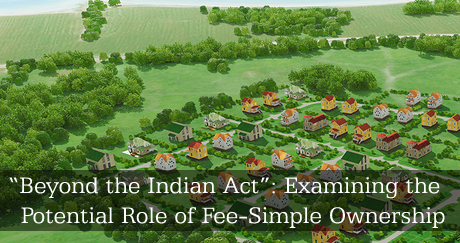
"Beyond the Indian Act": Examining the Potential Role of Fee-Simple Ownership - December 17th, 2012
Listen to the streamed podcast
Description
Host: Dr. B. James Deaton,
Dept. Of Food, Agricultural and Resource Economics (FARE), University of Guelph
Interviewee: Tom Flanagan is a Professor of Political Science at the University of Calgary.
Produced by: Jakub Hyzyk, Centre for Open Learning and Educational Development (COLES), University of Guelph
In this podcast Dr. Tom Flanagan, myself, and students from the University of Guelph discuss Tom’s research examining First Nations and private property rights. The podcast is unique because the majority of questions come from students who are interacting with Tom over a video connection between the University of Guelph and the University of Calgary. The podcast was recorded during my Land Economics course at the University of Guelph.
Dr. Flanagan's most recent book entitled Beyond the Indian Act: Restoring Aboriginal Property Rights, is co-authored with Chris Alcantara and André Le Dressay, with a foreword by Manny Jules. It was nominated for the Donner Prize in 2011.
Tom Flanagan received his Ph.D. in political science from Duke University in North Carolina. He has taught political science at the University of Calgary since 1968. He has published many books and articles on topics including aboriginal land claims, Canadian political parties, and game theory. His books have won a number of prizes, and he is a Fellow of the Royal Society of Canada.
Tom was campaign manager and chief of staff for Stephen Harper during the years 2001-05, when Mr. Harper was Leader of the Opposition. More recently, he managed the Wildrose campaign in the 2012 Alberta provincial election. Tom writes a monthly column for the Globe and Mail and appears twice a week as a political panelist on CBC-TV.
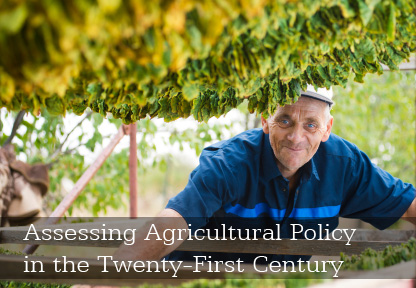
Assessing agricultural policy in the twenty-first century: Who benefits from Agricultural Subsidies? What happened after tobacco quota ended in Kentucky? - October 25th, 2012
Listen to the streamed podcast
Description
Host: Dr. B. James Deaton,
Dept. Of Food, Agricultural and Resource Economics (FARE), University of Guelph
Interviewee: Barrett Kirwan, Assistant Professor in the Department of Agricultural and Consumer Economics at the University of Illinois.
Produced by: Dr. B. James Deaton,
Dept. Of Food, Agricultural and Resource Economics (FARE), University of Guelph
In this podcast Barrett Kirwan and I discuss his research on two issues crucial to understanding agricultural policy and rural economic development in the twenty-first century.
We begin by discussing his research on farmland ownership, motivated by the question: to what extent do agricultural subsidies end up benefiting farmers? Later in the podcast we discuss his collaborative research examining what happened before and after tobacco quota ended in Kentucky.
Barrett Kirwan is an Assistant Professor in the Department of Agricultural and Consumer Economics at the University of Illinois. This Faretalk podcast covers the following two papers which he authored and co-authored:
"The Incidence of U.S. Agricultural Subsidies on Farmland Rental Rates,” Journal of Political Economy, 2009, 117(1).
"Aggregate and Farm-level Productivity Growth in Tobacco: Before and After the Quota Buyout" with Kirk White and Shinsuki Uchida, American Journal of Agricultural Economics, 2012, 94(4).
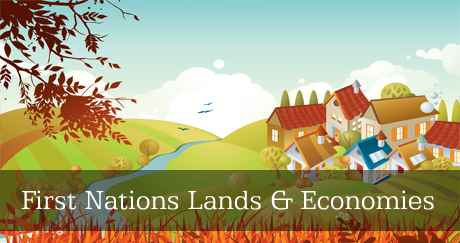
First Nations Lands and Economies -
September 13th, 2012
Listen to the streamed podcast
Download "First Nations Lands and Economies" - high quality MP3
Description
Host: Dr. B. James Deaton,
Dept. Of Food, Agricultural and Resource Economics (FARE), University of Guelph
Interviewee: Chief Robert Louie, First Nations Lands Advisory Board.
Produced by: Jakub Hyzyk, Centre for Open Learning and Educational Development (COLES), University of Guelph
In this podcast Chief Robert Louie and I discuss the management and control of First Nations Land. Chief Louie is the Chief of the Westbank First Nation. He is the chairman of the First Nations Lands Advisory Board since 1989 and a member of the Order of Canada. More information on the First Nations Lands Advisory Board can be found here: https://www.fafnlm.com/indexe.html.
Our podcast discussion focuses on the historic 1996 Framework Agreement on First Nations Land Management. The framework agreement and the First Nations Land Management Act (1999) enable First Nations to replace the Indian Act with their own land code. We discuss the background of this agreement, the required steps for adoption, and the economic and social consequences.

Does Dutch Disease Explain Canada's Manufacturing Woes?
Does Dutch Disease Explain Canada's Manufacturing Woes? - June 14th, 2012
Listen to the podcast
Download "Canada's Manufacturing Woes" - high quality MP3
Read the transcript for "Canada's Manufacturing Woes"
Jeremy Leonard is research director at the Institute for Research on Public Policy. He has been affiliated with the IRPP in a variety of research capacities since 1994. He is the co-editor of A Canadian Priorities Agenda: Policy Choices to Improve Economic and Social Well-Being (2007), and currently directs the Institute’s Competitiveness, Productivity and Economic Growth research program. Prior to his association with the IRPP, Jeremy was a policy analyst with the Committee for Economic Development, based in Washington, DC, and an economist with the Manufacturers Alliance/MAPI in Arlington, Virginia.
Description
Host: Dr. B. James Deaton,
Dept. Of Food, Agricultural and Resource Economics (FARE), University of Guelph
Interviewee: Jeremy Leonard, Research director at the Institute for Research on Public Policy.
Produced by: Jakub Hyzyk, Centre for Open Learning and Educational Development (COLES), University of Guelph
In this podcast Jeremy Leonard and I discuss a paper that he and his colleagues – Mohammad Shakeri and Richard S. Gray – recently published through the Institute for Research on Public Policy. The paper is titled, "Dutch Disease or Failure to Compete? A Diagnosis of Canada's Manufacturing Woes," and is available for download through the following link: https://www.irpp.org/en/research/competitiveness/dutch-disease-or-failure-to-compete-a-diagnosis-of-canadas-manufacturing-woes/.
Jeremy provides an overview of the empirical approach he and his colleagues used to examine whether the recent resource boom negatively influenced manufacturing output in Canada. He concludes that Canada suffers a mild case of Dutch disease and that the Dutch Disease effect does not likely explain Canada’s manufacturing woes. We conclude the podcast by discussing Jeremy's ideas on how this research may influence contemporary policy making.
Newer Podcasts | Previous Podcasts
Podcasts sponsored by The Institute for the Advanced Study of Food and Agricultural Policy.

